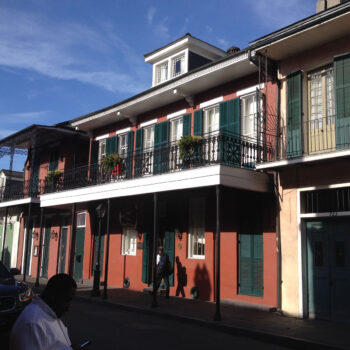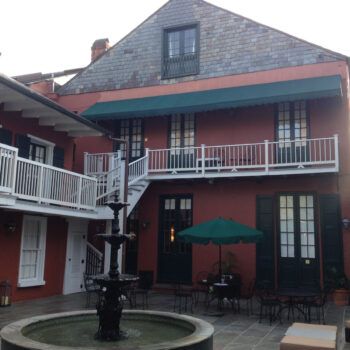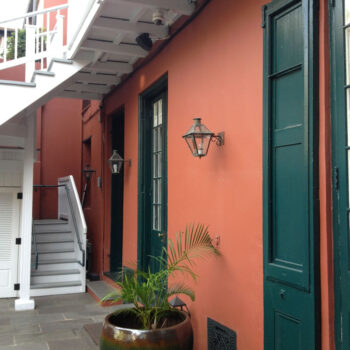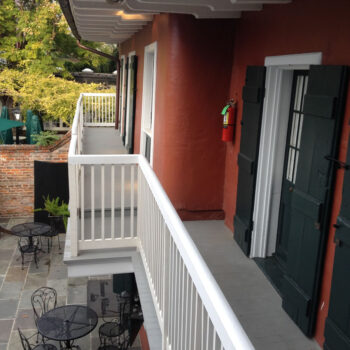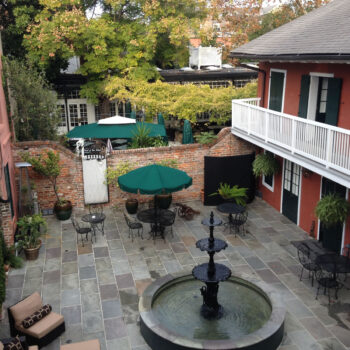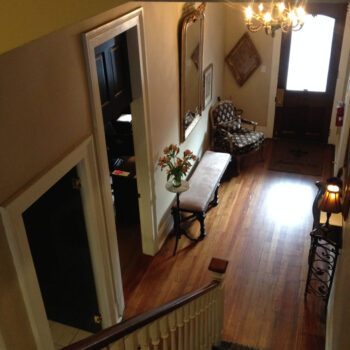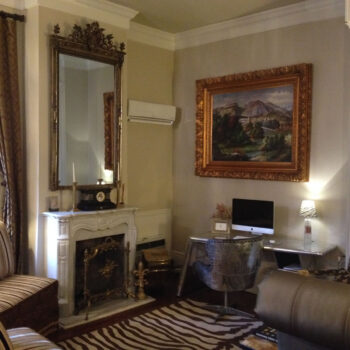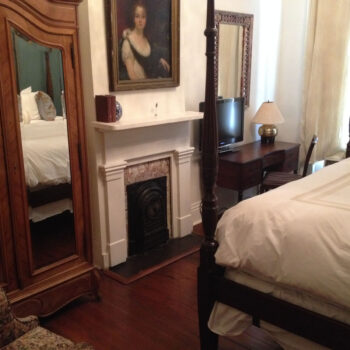Very few structures within New Orleans’ French Quarter predate the two fires, in 1788 and 1794, which destroyed most of the early building stock of the city. The circa 1800 service wing of 727 Toulouse appears to be one of the oldest structures still standing in New Orleans. It retains numerous features characteristic of dependencies constructed within New Orleans’ period of Spanish Colonial rule (1763-1803): brick masonry construction of solid walls without framing on the 1st floor, topped with a heavy timber, brick-between-posts effort on the 2nd floor, wooden balcony with simple wooden railing, the balcony covered by an extension of the roof unsupported by columns, unadorned bracket design and an interior devoid of corridors. The service wing’s front elevation is also individually noteworthy due to its step-back, accomplished by an attractive curve in the exterior masonry wall. The structure’s significance has long been recognized, as it was the subject of an Historic American Building Survey project in 1936.
The ground floor of the main house on the property is approximately two decades younger than its dependency. First mentioned in 1822, the main house documents an evolution typical of French Quarter properties throughout the 19th century. In the mid-1800s, the house was the residence of Antoine Amede Peychaud, inventor of the Sazerac cocktail. Sanborn Fire Insurance maps confirm that as late as 1885, the main house was 1 and ½ stories in height, with a five-bay ground floor topped with a side-gabled roof possessing two dormers facing Toulouse Street. Not long thereafter, the main house acquired a full second story; the 1896 Sanborn map depicts a 2-story structure now dedicated to commerce. “2nd-hand furniture store” is the listed business, and the service wing was used at that point as a stable and for storage. The late-19th century addition exhibits Eastlake detailing, with the new second story Toulouse Street façade sporting six bays of uniform dimension, occupied by four-over-four windows characteristic of the time, in turn allowing for access to a balcony finished with an elaborate cast iron railing.
By the mid-20th century, the property was being operated as the Hotel Maison de Ville, an intimate, twelve-room establishment widely recognized as one of the gems of New Orleans’ burgeoning hospitality sector. New ownership committed to a $2.1 million rehabilitation in 2010, and Crescent Growth Capital was retained the following year to provide contingent fee-based historic preservation consulting and historic tax credit monetization services.
Crescent’s in-house historic preservation specialist prepared a seven-element Historic Preservation Certification Application over a prolonged redevelopment period lasting a full five years, submitting Louisiana State HPCAs in conjunction with the federal application parts. Part 3 approval was received on April 28, 2016, with state historic tax credit monetization accomplished by Crescent and tax credit sale proceeds delivered to 727 Toulouse, LLC in July.
Now beginning its third century, 727 Toulouse is today operating as The Celestine, an acclaimed, ten-room boutique hotel in the heart of the French Quarter.
727 Toulouse St, New Orleans, LA 70130

